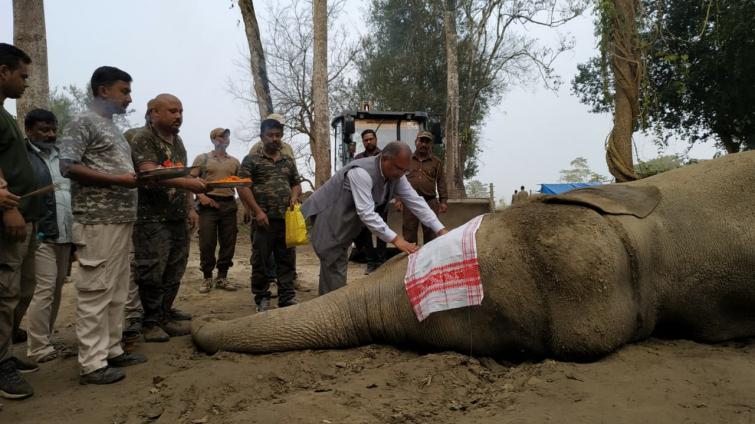Tragic Incident: Three Elephants Killed in Assam; Suspected Case of Electrocution

Tragic Incident: Three Elephants Killed in Assam; Suspected Case of Electrocution
The unfortunate incident occurred in Assam’s Kamrup district, where three wild elephants lost their lives while searching for food at a betel nut farm. According to an official, the incident happened around 2 am on Friday, and it appears to be a case of electrocution. The use of electric fences or live wires to protect agricultural lands is a common practice in some areas, but it poses a significant threat to wildlife, especially elephants, as they can accidentally come into contact with the electrified wires while foraging for food.
Assam has been grappling with the issue of human-wildlife conflict, leading to the loss of around 250 elephants in the last 10 years. The state had the second-highest population of wild elephants in India, with 5,719 elephants, as per a census conducted in 2017. The increasing encroachment of human settlements into elephant habitats and the lack of proper mitigation measures have been contributing factors to the rise in such incidents. Authorities are continually working to find ways to address this complex issue and protect both wildlife and human communities.
Electrocution, poisoning, and train accidents are indeed some of the major causes of elephant deaths in Assam. As you mentioned, farmers often use electric fences to protect their crops from elephants, which can lead to accidental electrocution of the elephants when they come into contact with the live wires.

Poisoning is another significant threat to elephants in the region. Some farmers and communities use poisoned food or water sources to deter elephants from their agricultural lands, leading to tragic consequences for the elephants.
Additionally, train accidents have been a recurring issue in areas where railway lines intersect with elephant corridors. The fast-moving trains can pose a danger to elephants crossing the tracks, resulting in fatal accidents.
The increase in human settlements and encroachments into elephant habitats has intensified the human-wildlife conflict in Assam, leading to these unfortunate incidents. Conservationists and authorities are working to implement measures to mitigate the conflict and protect both elephants and human communities while also raising awareness about the importance of coexistence with wildlife.
The incident underscores the ongoing challenges of human-wildlife conflict in the region and the need for implementing appropriate measures to prevent such incidents in the future.
The loss of three wild elephants is a significant blow to the already vulnerable elephant population in Assam. It highlights the importance of finding sustainable solutions that ensure the safety of both human communities and wildlife.

Addressing the issue of electric fences and their potential risks to elephants and other wildlife is crucial. Finding alternative methods for crop protection that are less harmful to wildlife while supporting the livelihoods of farmers is essential to reduce human-wildlife conflict.
Conservation efforts, along with raising awareness about elephant habitats and corridors, are essential in safeguarding these magnificent animals and their ecosystems. Collaborative efforts between local communities, wildlife authorities, and conservation organizations are necessary to protect and preserve the wildlife heritage of Assam and maintain a healthy balance between humans and wildlife.
It’s essential that forest officials are conducting a post-mortem of the elephants to determine the exact cause of their deaths and ascertain if it was indeed an accidental incident. Understanding the circumstances that led to the tragic event can help authorities take preventive measures to avoid similar incidents in the future.
The fact that the live wire was at a considerable height and fell due to the falling betel nut tree indicates that this may have been an unforeseen accident rather than a deliberate human-induced act. However, it is crucial for the authorities to thoroughly investigate the incident to rule out any foul play or negligence.

Human-elephant conflicts remain a significant challenge in regions where humans and wild animals coexist, and such incidents highlight the importance of promoting coexistence measures and finding sustainable solutions to mitigate such conflicts. It also underscores the need for raising awareness among local communities about wildlife protection and the importance of preserving the natural habitat of these magnificent creatures.
Conservationists and authorities must continue to work together to safeguard the well-being of both humans and wildlife, ensuring that such unfortunate incidents are minimized in the future.




